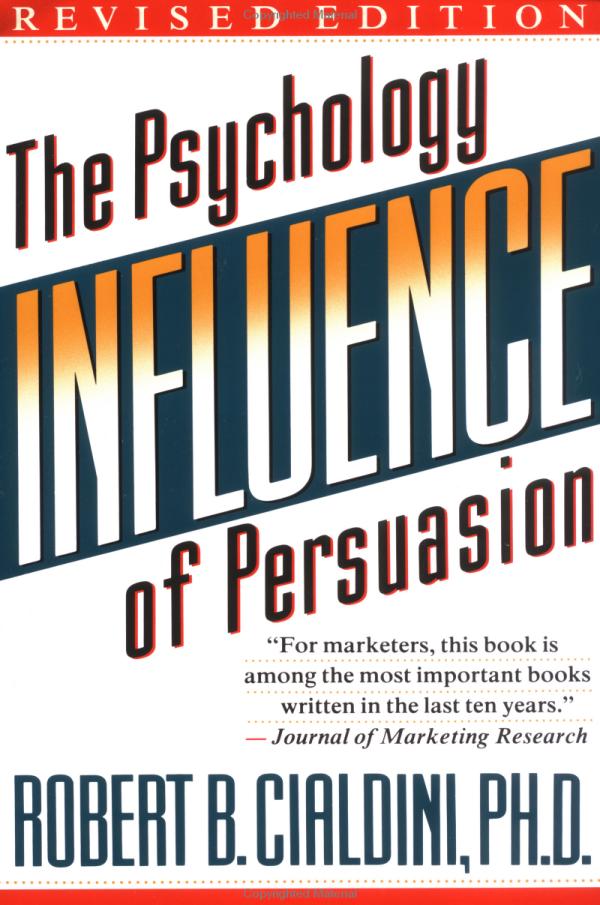
I just finished reading Influence, by Robert Cialdini. The book is about persuasion and examines the psychology of why people say "yes". I've never been a fan of the psychology of sales (I don't like the notion of tricking someone into buying something) but the book definitely gets you thinking. It basically walks through 6 "principles of influence". The principles are: reciprocity, scarcity, consistency, consensus, authority and liking.
The book describes each principle and gives several examples of them in action. I've included some of the more interesting examples below.
The book describes a study where people go to homes and ask if they can place a small sign in the owner's front yard promoting a charity of some kind. Then, a few weeks later, the same people come back and ask if they can put a much, much larger sign in the front yard. They find that the people that said yes to the small sign are far, far more likely to say yes to the larger sign than the average person. This is the notion of consistency -- once you know you're the kind of person that puts a sign on your front yard, you become much more likely to do so when the stakes are raised. There are some obvious applications of this in sales (e.g. small deals that turn into large deals over time).
Another study found that when you call a potential voter and ask them if they're going to vote and they say "yes", they're far more likely to actually go out and vote than they would've been had they not taken the call (again, people like to appear consistent)
Several studies have found that we are far more likely to help people that dress like us.
In one controversial Ohio political election a few years ago, a man given little chance of winning the state attorney-general race swept to victory when, shortly before the election, he changed his name to Brown—a family name of much Ohio political tradition.
Salespeople in men's suits stores will always show the customer the most expensive suit first. Because when it comes time to buy a sweater or a pair of shoes, these look very expensive when contrasted wiht the expensive suit. It turns out that when a man enters a clothing store with the express purpose of purchasing a suit, he will almost always pay more for whatever accessories he buys if he buys them after the suit purchase than before.
This principle is applied in this excerpt from the book which is a letter from a college student to her parents.
Dear Mother and Dad:
Since I left for college I have been remiss in writing and I am sorry for my thoughtlessness in not having written before. I will bring you up to date now, but before you read on, please sit down. You are not to read any further unless you are sitting down, okay? Well, then, I am getting along pretty well now.
The skull fracture and the concussion I got when I jumped out the window of my dormitory when it caught on fire shortly after my arrival here is pretty well healed now. I only spent two weeks in the hospital and now I can see almost normally and only get those sick headaches once a day. Fortunately, the fire in the dormitory, and my jump, was witnessed by an attendant at the gas station near the dorm, and he was the one who called the Fire Department and the ambulance. He also visited me in the hospital and since I had nowhere to live because of the burntout dormitory, he was kind enough to invite me to share his apartment with him. It’s really a basement room, but it’s kind of cute.
He is a very fine boy and we have fallen deeply in love and are planning to get married. We haven’t got the exact date yet, but it will be before my pregnancy begins to show. Yes, Mother and Dad, I am pregnant. I know how much you are looking forward to being grandparents and I know you will welcome the baby and give it the same love and devotion and tender care you gave me when I was a child.
The reason for the delay in our marriage is that my boyfriend has a minor infection which prevents us from passing our pre-marital blood tests and I carelessly caught it from him.
Now that I have brought you up to date, I want to tell you that there was no dormitory fire, I did not have a concussion or skull fracture, I was not in the hospital, I am not pregnant, I am not engaged, I am not infected, and there is no boyfriend. However, I am getting a “D” in American History, and an “F” in Chemistry and I want you to see those marks in their proper perspective.
Your loving daughter, Sharon
There are lots of funny and interesting examples like this throughout the book.
Influence is pretty good and definitely worth the read if you have an interest in this topic. But like most business books it's way too long. So if you only have moderate interest in this topic, I'd try to find a cliff notes version.
